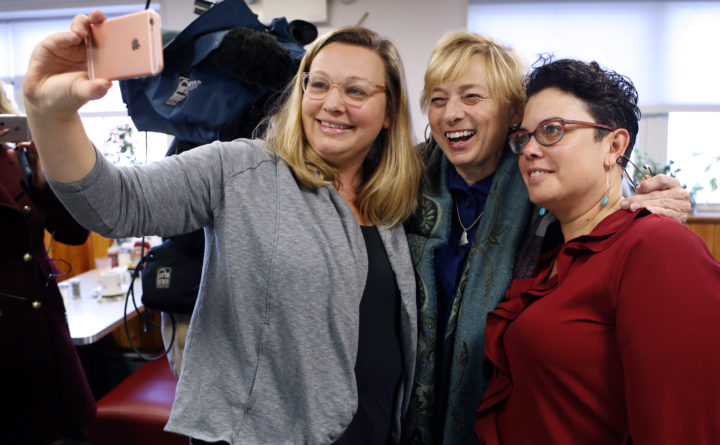
Good morning from Augusta. The 2018 election was the best in Maine history for women candidates with Attorney General Janet Mills readying to become the state’s first female governor and a record number of women set to serve in the Maine Legislature in 2019.
They did this with high levels of support from women voters, according to Election Day exit polling of more than 1,000 Maine voters by the Bangor Daily News, the electoral reform group FairVote and Colby College. It matched national trends for the 2018 election.
Maine’s two biggest 2018 campaigns saw a double-digit gap among women voters between Democrats and Republicans. Mills ended up winning the governor’s race with 50.6 percent of votes, surpassing Gov. Paul LePage’s 2014 total to win the most votes for governor in Maine history. Her total was nearly 8 percentage points higher than Republican Shawn Moody’s total of 43.2 percent with independent State Treasurer Terry Hayes taking 6 percent of votes.
Mills dominated among women, taking 57.8 percent of their votes to Moody’s 31.7 percent in our exit poll, which was weighted by age and gender to better represent the state’s electorate.
Moody only won narrowly among men, taking 47.4 percent of their votes to Mills’ 45.6 percent. Hayes’ base was largely among women as well, but she only won 8.7 percent of their votes in the exit poll to just 5 percent from men. None of this was enough to harm Mills.
Something similar happened in the race for Maine’s 2nd Congressional District, where a ranked-choice count last week named Assistant Maine House Majority Leader Jared Golden, a Democrat, the winner over U.S. Rep. Bruce Poliquin, a Republican who is challenging the voting method in court.
In the exit poll, the gender gap in this race was virtually a mirror image. Golden won 51.2 percent of women to Poliquin’s 39.2 percent in the first round of voting. Poliquin actually did better among men, winning 53.7 percent of their votes to Golden’s 39.2 percent.
But it was the female-dominated group of voters who selected one of the two independents — Tiffany Bond of Portland and Will Hoar of Southwest Harbor — who broke the election for Golden in the second round of counting. Bond won 7.4 percent of women in the first round to just 3 percent of men and her supporters in our exit poll.
Democrats saw similar gender gaps across the country in 2018. This was the first time that the BDN has done Election Day exit polling. (We’ll be aiming to do it again in the future, since it’s a powerful reporting tool that gave us a glimpse into the 2nd District ranked-choice count before it was run.) That means we don’t have past figures to compare our numbers to.
But in congressional races across the country, CNN saw a similar pattern in its exit polling. Democrats won 59 percent of votes from women in those races, a margin that they hadn’t seen in exit polls since 1982, according to The Washington Post.
Exit polling was administered by the Bangor Daily News and paid for by FairVote, a group that supports ranked-choice voting. Polling was conducted by students at eight Maine universities and colleges in 15 municipalities. The pollsters were Nina Mahaleris and Nick Gillert in Bangor, Aaron Lee and Allison Emery in Cumberland, Andrew Blunt in Topsham, Paul Riley in Buxton, Terry Ziccardi in Arundel, Sophie Kaplan in Owls Head, Samantha Clark in Chelsea, Alyce McFadden in Vassalboro, Thomas Young in Jay, Quinn Galletta in Lincoln, Molly Riportella in Sidney, Becca Pelletier in Searsport, Kevin Fitzpatrick in Southwest Harbor, Liam Brinkler in Rangeley and Lucas Dwornik in Kingfield.
This article originally appeared on www.bangordailynews.com.




